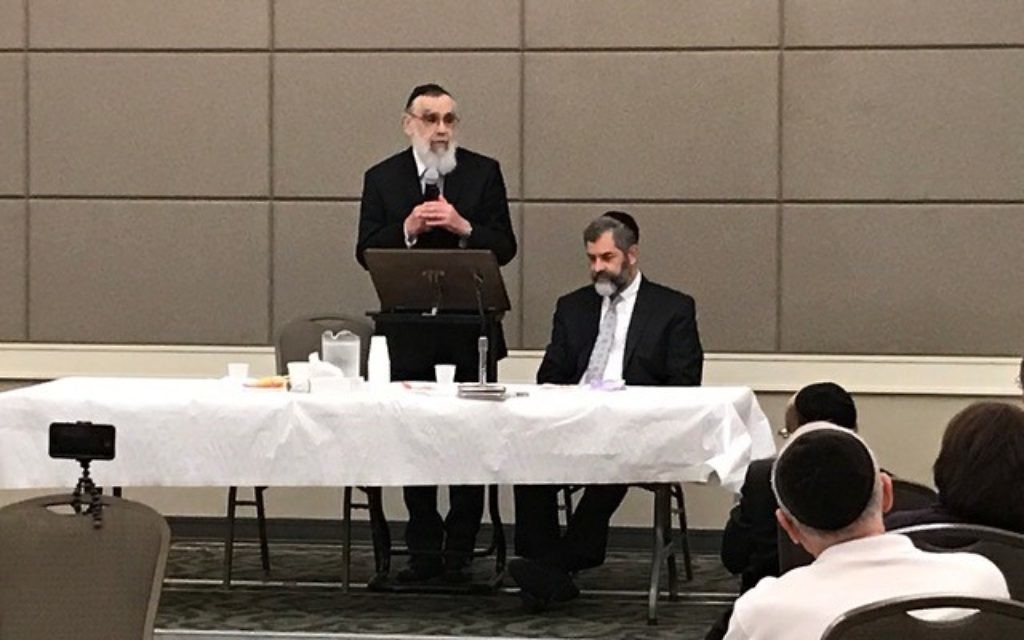Rabbis Share Tears of Joy, Sorrow 50 Years Later
Congregation Beth Jacob rabbi emeritus Emanuel Feldman relays personal account of Six-Day War.

Rabbi Emanuel Feldman was a visiting professor at Bar Ilan University in Ramat Gan on May 22, 1967, when he noticed three Israel Defense Forces buses loading students who were also trained paratroopers.
“That’s when I realized the mobilization was no longer a cold, objective fact but reality. Some of those students were mine, and they were being sent off to war to be killed, maimed, who knows? I just watched them in silence and cried,” the Congregation Beth Jacob rabbi emeritus said in speaking about the Six-Day War on Sunday, April 23, at the Toco Hills synagogue.
Rabbi Feldman also read excerpts from his book about the war, “The 28th of Iyar,” recently reissued for the 50th anniversary. In the book he mentions a student named Rachamim, who did not excel in class but was an admirer of the rabbi’s. One day Rachamim didn’t show up for class, and Rabbi Feldman learned that his student had enlisted in the army against doctor’s orders.
Get The AJT Newsletter by email and never miss our top stories Free Sign Up
Rabbi Feldman and his son and successor at Beth Jacob, Rabbi Ilan Feldman, together delivered the annual Amram Hillel Feldman Memorial Lecture about their experiences in Israel 50 years ago during the Six-Day War.
“Tonight is about miracles and a memory we are all too familiar with,” Rabbi Ilan Feldman said. “Fifty years ago … and 22 years after the Holocaust, Jews were once again threatened by their enemies, yet within a few hours Israel wiped out the Egyptian air force, took out the Arab armies, and took control of the Temple Mount, Jerusalem and the Golan Heights, among other territories, and we were there.”
His father said the family feared the worst as tensions rose in the buildup to the war. “We were not sure of anything. We didn’t know if President Lyndon B. Johnson would support Israel, if we could count on the United Nations, England or France.”
The Feldmans prepared bomb shelters by stocking food and producing sandbags.
Rabbi Feldman held back tears as he described a memory about one of his four children. “One day my 7-year-old daughter, Chava, came home from school and asked me, ‘Dad, what’s a bomb?’ It was like a bullet, and I felt cornered. After I explained it was very bad and that she should stay far away as possible, she said she already knew that, but then asked if the Arabs would drop a bomb on Israel and if G-d would let the Arabs hurt the holy country. I was again cornered and responded by saying, ‘OK, let’s have lunch.’ ”
On June 5, 1967, Rabbi Feldman woke to sirens. “Everything seemed normal, and there was no news by the Israeli government. I asked my neighbor what was going on, and he said it was just the alarm. I asked someone on the streets, and they stated it was just a drill. A second siren went off, this one more constant, and after I asked a passer-by what was happening, he replied, ‘It has begun in the Negev; Israeli army forces have responded to an attack.’ ”
The rabbi said he thought the fighting would last only a few hours, “but I soon arrived at the school and was told that the dormitories were being used for the wounded. The shops were all closed, and the roads were deserted, and I thought to myself, ‘Where is everybody?’ Then I remembered the air-raid shelters and raced to be with my family. We could hear noises and anti-aircraft guns outside while my wife and I thought to ourselves, ‘What are we doing here? Why are we here?’ ”
Israel wasn’t issuing much news about the war, but a neighbor’s radio was tuned to the Voice of America, Rabbi Feldman said. “The reports indicated that Israel destroyed the Egyptian air force, but we didn’t believe it. And yet it was true.”
The war opened the Kotel (Western Wall) to Jewish visitors for the first time since Israel’s founding in 1948.
“I took a field trip with my class, and when we were 70 to 80 yards from the Kotel, I saw my teacher run with his arms out and throw himself at the wall,” Rabbi Ilan Feldman said. “This taught me a very important lesson and what it is like to experience holiness.”
The aftermath of the Six-Day War was a time of joy but also sorrow because more than 770 Israeli soldiers were killed, many of them young paratroopers.
“It was not an easy fight, and we recall the events which occurred with tears and joy because we lived it and remember it in a very vivid way,” Rabbi Ilan Feldman said. “We live in a generation where we have seen miracles and witnessed some terrible things, yet we have a responsibility to remember pain, suffering, devotion and reawakening toward Judaism.”
After the war, Rabbi Emanuel Feldman said, he obtained a press pass for Bethlehem, where he saw “a paratrooper patrolling the area covered with dust. It was Rachamim.”
His student rushed to the rabbi and embraced him. “The first thing he asked me was if I was really going to fail him. The war was the last thing on his mind. I told him no, but he didn’t believe me,” Rabbi Feldman said. “However, I gave him an A-plus for his sacrifice, not only for me, but the Jewish people. He fought his way down to Jerusalem and was a soldier.”




comments